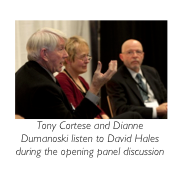By Sarah Brylinsky, Program Associate, Second Nature
(Download the symposium agenda, or a PDF version of this summary here.)
The first American College & University Presidents’ Climate Commitment(ACUPCC) Regional Collaborative Symposium – the 2012 Northeast Regional Symposium – took place at Bunker Hill Community College November 3-4, 2011. The Regional Symposiums focus on fostering collaboration among ACUPCC signatories facing similar challenges and opportunities in their geographic regions. This inaugural conference garnered participation from 36 universities in 19 states throughout the Northeast, achieving cross-institutional dialogue, knowledge exchange, and solutions to climate action planning, curriculum reform, and other key issues.
 Pre-Conference Change Agent Forum
Pre-Conference Change Agent Forum
This pre-conference event offered new signatories and schools striving to be compliant with ACUPCC requirements and their pledge to eliminate greenhouse gas emissions a series of “Climate Clinics” presented by representatives of colleges and universities, non-profit organizations, and private consulting companies.
Symposium Sessions
 Opening Speakers
Opening Speakers
Dr. Anthony Cortese, President of Second Nature, opened the Symposium evening of November 3 with David Hales, President Emeritus, College of the Atlantic and Chairman of the Second Nature Board of Directors, and Dianne Dumanoski, Environmental Journalist, with a discussion of the ever- increasing need for leadership in higher education to teach innovative, bold, and necessary climate and sustainability theory. The November 4 sessions were opened by Philip Giudice, the former Commissioner of the Massachusetts Department of Energy.

World Café: Moving Beyond the Climate Action Plan
Participants delved into dynamic discussion and planning during the World Café, which allowed for reflections on the planning process, how to move the campus forward by assigning priorities, key stakeholders, and core values, and engaging with regional partnerships and initiatives. Facilitated by Bonny Bentzin ofGreenerU, discussion reflected the need for institutionalizing engagement, the importance of connecting long-term climate planning to the needs of the local community and regional partners, and the potential for creating campus engagement with the Climate Action Plan as a living and strategic institutional document.
Sustainability and Curriculum Development
ACUPCC signatories have committed to take actions to make climate neutrality and sustainability a part of the curriculum and other educational experiences for all students. This session identified best practices for integrating sustainability into the curriculum, how to engage diverse stakeholders, measuring outcomes, and applying the concept of “group intelligence” to curriculum development. Facilitated by Cindy Thomashow, Education Manager, AASHE, with presentations by Dr. James Canniff, Vice President for Academic Affairs & Student Services, and Paul Wolff, Director of Sustainability, Bunker Hill Community College, Dr. Bradley Skelcher, Associate Provost at Delaware State University, and Deberah Johnson, Academic Director of Sustainability at Pratt Institute.
Presidents’ Panel 
Regional Presidents including Dr. Mary Fifield, Bunker Hill Community College, Dr. Paul Ferguson, The University of Maine, Gloria Larson, Bentley University, and Jonathan Lash, Hampshire College, discussed how higher education in New England can lead the way to a clean, green and sustainable economy, and the ways their individual institutions have benefited from participation in the ACUPCC. Crediting social necessity and positive feedback within their institutions, both new signatories and committed institutions were assured of the value of membership in the network.
Energy and Financing Case Studies
Three tracks for energy and financing included case studies from institutions across the northeast. The Energy Efficiency track highlighted the Bergen Community College Campus Energy Plan with P.J. Ricatto, Dean of Math, Science and Technology and Co-Sustainability Officer, the Energy Conservation and Capital Improvement Project with Pat Daly, Director, Campus Physical Plant, University of Massachusetts, and Jeff Kwiatkowski, Enterprise Solution Architect,Johnson Controls, as well as the Massachusetts Enterprise Energy Management System Project led by Eric Friedman, Director, Leading by Example Program, Massachusetts Department of Energy Resources.
The second track on Renewable Energy provided institutional examples and best practices on wind, biomass, and landfill-gas-to-energy projects by David Schmidt, Senior Special Programs Coordinator and Chair, Energy Management Department, Mt. Wachusett Community College, Jack Byrne, Director, Sustainability Integration Office, Middlebury College, and Michael Swartz, Energy and Utility Manager, University of Maine.
Track three, Financing, included Power Purchase Agreements by Deirdre Manning, Environmental Sustainability Director, Smith College, a look intoIntegrated Sustainability Financing with Kelly Boulton, Sustainability Coordinator, Allegheny College, and an overview of Revolving Loan Funds and the Billion Dollar Green Challenge with Mark Orlowski, Sustainable Endowments Institute.
 Summary
Summary
The first symposium attendees created strategies and solutions for addressing the key issues facing schools in the Northeast region, and learned from both campus and industry leaders that the work they do is more vital than ever.
By providing tangible resources, contacts, and ideas to support both presidents and their staffs efforts on campus, with a regional focus highlighting the unique issues associated with electricity rates, government policies, energy supply, and public opinion of the region, institutions were empowered to create beneficial partnerships that will support their mutual development in the coming years. Participating sustainability teams made significant headway in overcoming the obstacles to fulfilling the Commitment, and creating lasting regional connections.
127 college and university, industry, and non-profit representatives participated in the Symposium, with attendance from Presidents and Chancellors, sustainability coordinators, facilities directors, faculty, students, and ACUPCC Corporate Sponsors. Financial support from the Kresge Foundation was provided for qualifying minority-serving institutions and institutions classified as Title III and Title V of the Higher Education Act. The conference was held at Bunker Hill Community College in the college’s 2009 LEED Gold certified Health and Wellness Center at the Charlestown campus.
Final Note
Second Nature would like to thank the staff, faculty, and administration ofBunker Hill Community College for their partnership in hosting the event, and all attendees, who found exciting new opportunities for creating and implementing their Climate Action Plans, and creative solutions to the challenges of fostering a sustainable campus. Well done!

Add new comment